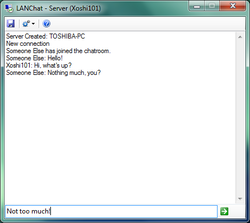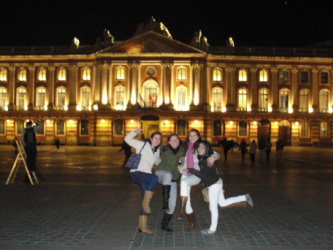
For one of my last language school projects, I presented a poem I had written as a critique of adolescent use of internet dating and short-hand chatroom vocabulary.
The only issue was that I needed to translate into French. So after hours researching French texting lingo. Here's the original and the French "translation" side by side:
| <3 sugary sweet sara <3 says: i met my bf 2day @ cupid.com that's y i couldn't talk 2 u b4 i said 2 him, how r u? want 2 im? @ cupid.com i could c my bf pic ;-) lol i said 2 him, how r u? want 2 im on msn i could c my bf pic ;-) lol i couldn't stop :-)ing on msn omg he is like sooo hott i couldn't stop :-)ing @ the hottest guy on the www omg he is like sooo hott i <3ed him already the absolutely hottest kewlest guy on the www said g2g, cya i asked y i <3ed him already bc idk i asked y i was soooo :-( he was offline, I wanted 2 :’( bc idk omg is that him? i was soooo :-( he was offline…jk that's y i couldn't talk 2 u b4 omg! it is him! he says hi :-0 ttyl i met my bf 2day | <3 sara super sucrée <3 dit: G rencontré 1 mek auj @ cupid.com C pr ça ke j ne pouvé pa te parlé avan J l8 é di slt komencava ? TOQP ? parlo @ cupid.com J pouvé voir son foto mdr ;) J l8 é di, slt komencava ? TOQP ? parlo sur msn J pouvé voir son foto mdr ;) j ne pouvé pa aréT 2 J sur msn omd il è oZ j ne pouvé pa aréT 2 J @ Le mec le + oZ sur le net omd il è oZ J l8 é déjà di jtm le mec le + oZ sur le net m’a dit g2g @+ G 2manD Pkoi J l8 é déjà di jtm PK jnsp G 2manD Pkoi j’éT tllmt L Kil éT DconnecT. J voulé :’( PK jnsp omd C l8 ? j’éT tllmt L Kil éT DconnecT… j'dec C pr ça ke j ne pouvé pa te parlé avan omd C l8 ! il di slt :O @+ G rencontré 1 mek auj |
| <3 = un cœur, aimer G = J’ai 1 = un mek = garçon auj = aujourd’hui @ = à C = c’est pr = pour ke = que jJ= je pouvé = pouvais pa = pas parlé = parler avan = avant l8 = lui é = ai di = dit slt = Salut komencava ? : Comment ça va ? TOQP ? : T’es occupé ? parlo = Parlons | foto : photo mdr = mort de rire aréT = arrêter2 = de omd = Oh mon dieu ! è = est oZ = osé + = plus net = Internet jtm = Je t’aime g2g = je dois partir @+ = à plus 2manD = demandé Pkoi = Pourquoi ? PK = parce que jnsp = je ne sais pas j’éT = j’étais tllmt = tellement Kil = qu’il DconnecT = déconnecté voulé = voulais j'dec = je déconne |




 RSS Feed
RSS Feed